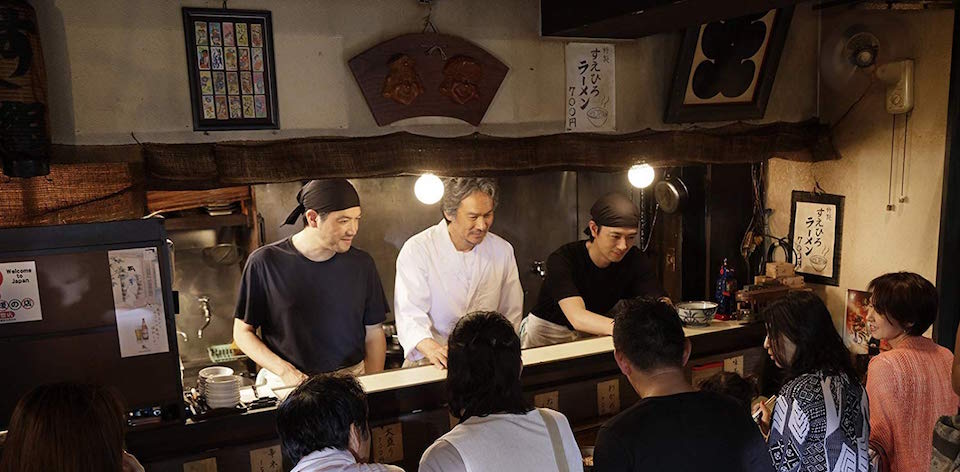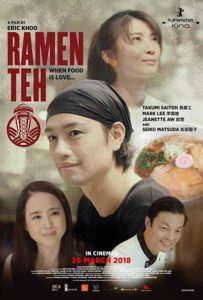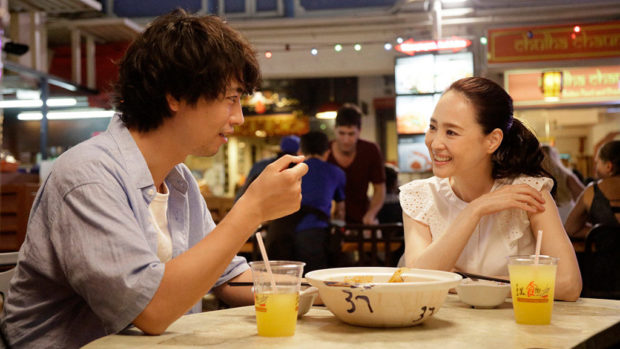The title of Eric Khoo’s RAMEN SHOP (ラーメン・テー or Ramen Teh) instantly immerses viewers in the rich history of foodie dramas that dominate Japanese popular culture. Just look at the fine selection of “gurume doramas” (gourmet dramas) that populates Netflix at the moment, from Samurai Gourmet to Midnight Diner: Tokyo Stories. Of course, Juzo Itami’s Tampopo* is synonymous with modern Japanese cinema, and from the food porn close-ups of Khoo’s opening sequence, you’d be forgiven for thinking that you were right back in that territory.
Khoo uses food in this films as a means to bridge an inter-generational and international divide. Ramen chef Masato (Takumi Saito, Blank 13), born to a Japanese father and a Singaporean mother, decides to return to his mother’s homeland following his father’s (Tsuyoshi Ihara) death. The latter was emotionally distant following the death of Masato’s mother. With both of his parents gone, Masato takes a culinary journey to Lion City in Singapore to reconnect with a lost side of the family.
Known for being one of the leading voices in the revival of Singaporean cinema, you’d be forgiven for doing a double-take over his inclusion in the Japanese Film Festival this year. Yet Khoo’s outlook is as international as his CV, and there’s a tangible connection between this film and his 2011 manga adaptation Tatsumi, along with the more food-focused ventures of Mee Pok Man and documentary Wanton Mee. Here the simple bowls of hearty broth serves as both a connection to the past and a healing balm between disaffected generations.
Masato’s ostensible guide on this journey is food blogger Miki (Seiko Matsuda), and there are moments in their conversations that feel like a Food Network travelogue. Yet Khoo’s narrative goes much deeper than the food itself, peppered with flashbacks to his parents’ courtship. Through this, Masato also explores the atrocities of Japanese war crimes and a grief cycle over half a century old. This subplot is somewhat simplistically presented, as Masato reunites with his Uncle Wee (Mark Lee/Lee Kok Huang) and estranged grandmother via a diary his mother left behind.
The final few scenes do a deep-dive into emotional manipulation. While these moments may result in a few tears being shed, they are also very consciously constructed around some well-worn tropes. There’s even a thumbs-up smile that could have stepped straight out of the opening credits of a 1980s sitcom. Nevertheless, there’s plenty of substance in this dish, one that says more about commonalities than it does about differences. Just don’t watch this film on an empty stomach.
*Also playing at the Japanese Film Festival in 2018 in a lovingly restored 4K edition.
[stextbox id=”grey” bgcolor=”F2F2F2″ mleft=”5″ mright=”5″ image=”null”] 2018 | Japan, Singapore, France | DIR: Eric Khoo | WRITERS: Eric Khoo | CAST: Takumi Saito, Seiko Matsuda, Mark Lee, Tsuyoshi Ihara | DISTRIBUTOR: Elephant House (JPN), Japanese Film Festival (AUS) | RUNNING TIME: 89 minutes | RELEASE DATE: October – December 2017 (JFF) [/stextbox]
2018 | Japan, Singapore, France | DIR: Eric Khoo | WRITERS: Eric Khoo | CAST: Takumi Saito, Seiko Matsuda, Mark Lee, Tsuyoshi Ihara | DISTRIBUTOR: Elephant House (JPN), Japanese Film Festival (AUS) | RUNNING TIME: 89 minutes | RELEASE DATE: October – December 2017 (JFF) [/stextbox]






